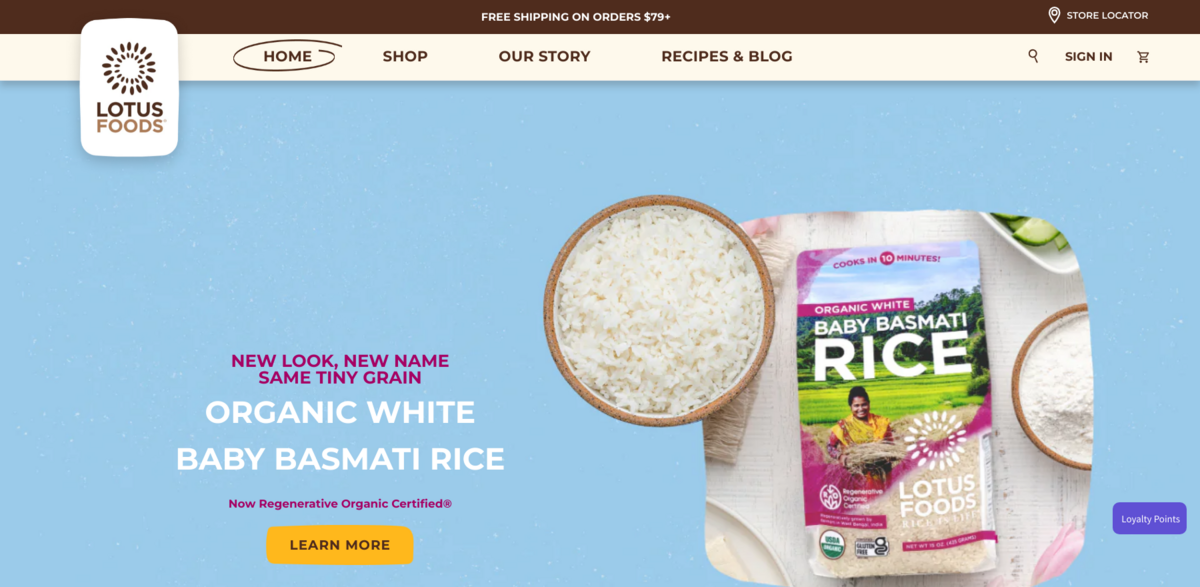What Lotus Foods Is All About
Lotus Foods is more than just a rice company — it’s a movement toward good food with a global impact. Born from a love story sparked by tasting a rare black rice in China, known as “tribute rice” or “longevity rice” reserved for emperors, Lotus Foods has grown into a brand committed to changing how rice is grown worldwide. Their mission? To lead the way in rice farming practices that tackle climate change, empower women, and build resilience for farmers. It’s about sustainable, organic, and fair-trade rice that nourishes people and the planet alike.
The Main Benefits of Lotus Foods’ Approach
Lotus Foods doesn’t just talk the talk — their impact speaks volumes:
- ±5000 household members benefit from organic and Fair Trade premiums.
- 40% less methane emissions from fields using More Crop Per Drop® practices.
- ±300 hours less work per acre for women thanks to women-friendly farming methods.
- 500 million gallons less water used annually through More Crop Per Drop® techniques.
These numbers show how sustainable farming can be both good for the earth and for the people who grow the rice.
Delicious Recipes That Make a Difference
Lotus Foods isn’t just about farming — it’s about creating meals that matter. Their holiday rice recipes bring bold flavors and easy cooking to the table. Imagine whipping up a quick kimchi fried rice bursting with umami, or a creamy, cheesy ramen that’s rich and comforting. For something a bit more exotic, the carrot ginger yellow curry ramen combines fragrant spices with gluten-free rice noodles for a nourishing bowl that’s as tasty as it is wholesome. These recipes show how sustainable rice can shine in everyday cooking.
How Lotus Foods Supports Farmers and Communities
At the heart of Lotus Foods is a deep commitment to smallholder farmers around the world. By sourcing rice from family farms and paying organic and Fair Trade premiums, they help increase incomes and attract the next generation of growers. Beyond that, they fund local improvement projects and job growth through Fair Trade social premiums. It’s a holistic approach that balances economic opportunity with environmental stewardship, ensuring farmers thrive while protecting natural resources.
The More Crop Per Drop® Method
More Crop Per Drop® is Lotus Foods’ signature agroecological rice-growing method, based on the System of Rice Intensification (SRI). What’s cool about it? Farmers don’t need special seeds or chemicals. Instead, they optimize how rice plants grow, boosting yields and conserving resources. This regenerative organic practice reduces water use dramatically and cuts methane emissions, making rice farming kinder to the planet. It’s a smart, sustainable way to grow rice that benefits everyone involved.
Project Impact and Sustainable Development Goals (SDGs)
- SDG 2: Zero Hunger — improving food security through sustainable rice farming.
- SDG 5: Gender Equality — empowering women with women-friendly farming practices.
- SDG 6: Clean Water and Sanitation — reducing water use by 500 million gallons annually.
- SDG 13: Climate Action — cutting methane emissions by 40% with More Crop Per Drop®.
- SDG 15: Life on Land — promoting organic and regenerative agriculture to restore ecosystems.
- SDG 8: Decent Work and Economic Growth — increasing incomes and supporting smallholder farmers.
Meet the Farming Communities Behind the Rice
Lotus Foods partners with a diverse group of farming communities across Asia, each bringing unique traditions and sustainable practices to the table. From PraTithi Organic Foods in India, championing organic farming with small and marginal farmers, to Dalian Hongren in China, growing heirloom black Forbidden Rice on family farms for over two decades. In Thailand, FoodTech Solutions and the Amnatcharoen Organic Agricultural Community Enterprise Network work to balance power between small producers and big millers, while OASIS supports 650 small-scale farmers growing organic red rice. Cambodia’s COFE focuses on food security and health, and Indonesia’s Bloom Agro supplies a traditional tricolor blend of whole grain rices. Together, these partnerships create a global network committed to fair trade, organic growing, and preserving heirloom varieties.


















